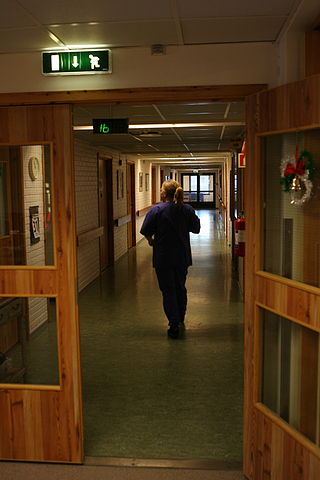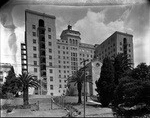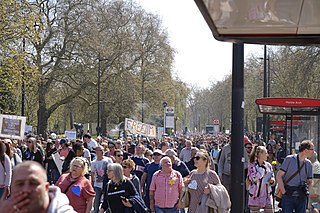Related Research Articles
Nursing in the United Kingdom has a long history. The current form of nursing is often considered as beginning with Florence Nightingale who pioneered modern nursing. Nightingale initiated formal schools of nursing in the United Kingdom in the late 19th and early 20th centuries. The role and perception of nursing has dramatically changed from that of a handmaiden to the doctor to professionals in their own right. There are over 700,000 nurses in the United Kingdom and they work in a variety of settings, such as hospitals, health centres, nursing homes, hospices, communities, military, prisons, and academia, with most working for the National Health Service (NHS). Nurses work across all demographics and requirements of the public: adults, children, mental health, and learning disability. Nurses work in a range of specialties from the broad areas of medicine, surgery, theatres, and investigative sciences such as imaging. Nurses also work in large areas of sub-specialities such as respiratory, diabetes, cancer, neurology, infectious diseases, liver, research, cardiac, women's health, sexual health, emergency and acute care, gastrointestinal, infection prevention and control, neuroscience, ophthalmic, pain and palliative, and rheumatology. Nurses often work in multi-disciplinary teams but increasingly are found working independently.

A nursing shortage occurs when the demand for nursing professionals, such as Registered Nurses (RNs), exceeds the supply locally—within a healthcare facility—nationally or globally. It can be measured, for instance, when the nurse-to-patient ratio, the nurse-to-population ratio, the number of job openings necessitates a higher number of nurses than currently available, or the current number of nurses is above a certain age where retirement becomes an option and plays a factor in staffing making the workforce in a higher need of nurses. The nursing shortage is global according to 2022 World Health Organization fact sheet.

PIH Health Good Samaritan Hospital is a hospital in Los Angeles, California. The hospital has 408 beds. In 2019 Good Samaritan joined the PIH Health network.

The Bahrain health worker trials were a series of legal cases in which forty-eight doctors, nurses, and dentists faced charges for their actions during the Bahraini uprising of 2011. In September 2011, twenty of the health workers were convicted by a military court of felonies including "stockpiling weapons" and "plotting to overthrow the government". The remaining twenty-eight were charged with misdemeanors and tried separately. The following month, the felony sentences were overturned, and it was announced that the defendants would be retried by a civilian court. Retrials began in March 2012, but were postponed until June 14. Convictions against nine of the defendants were quashed and reduced against another nine. The Court of Cassation upheld the sentences against the remaining nine on 1 October.

Elmhurst Hospital Center (EHC), also known as NYC Health + Hospitals/Elmhurst, is a 545-bed public hospital in the Elmhurst neighborhood of Queens in New York City. It is one of the 11 acute care hospitals of NYC Health + Hospitals, a public benefit corporation of the city.

The Second Arab Spring is a series of anti-government protests which took place in several Arab world countries from late 2018 onwards.
The Doctors’ Association UK (DAUK) is a professional association for doctors in the United Kingdom. The association was formed by junior doctors led by Samantha Batt-Rawden in January 2018 in response to the Bawa-Garba case.

Shortages related to the COVID-19 pandemic are pandemic-related disruptions to goods production and distribution, insufficient inventories, and disruptions to workplaces caused by infections and public policy.

The NHS Nightingale Hospital London was the first of the NHS Nightingale Hospitals, temporary hospitals set up by NHS England for the COVID-19 pandemic. It was housed in the ExCeL London convention centre in East London. The hospital was rapidly planned and constructed, being formally opened on 3 April and receiving its first patients on 7 April 2020. It served 54 patients during the first wave of the pandemic, and was used to serve non-COVID patients and provide vaccinations during the second wave. It was closed in April 2021.

Strikes occurred during the COVID-19 pandemic due to many factors including: hazard pay or low pay, unsafe working conditions, inability to pay rent. These strikes are separate from the various protests that occurred over responses to the pandemic.

The COVID-19 pandemic has impacted hospitals around the world. Many hospitals have scaled back or postponed non-emergency care. This has medical consequences for the people served by the hospitals, and it has financial consequences for the hospitals. Health and social systems across the globe are struggling to cope. The situation is especially challenging in humanitarian, fragile and low-income country contexts, where health and social systems are already weak. Health facilities in many places are closing or limiting services. Services to provide sexual and reproductive health care risk being sidelined, which will lead to higher maternal mortality and morbidity. The pandemic also resulted in the imposition of COVID-19 vaccine mandates in places such as California and New York for all public workers, including hospital staff.

The COVID-19 pandemic has impacted healthcare workers physically and psychologically. Healthcare workers are more vulnerable to COVID-19 infection than the general population due to frequent contact with infected individuals. Healthcare workers have been required to work under stressful conditions without proper protective equipment, and make difficult decisions involving ethical implications. Health and social systems across the globe are struggling to cope. The situation is especially challenging in humanitarian, fragile and low-income country contexts, where health and social systems are already weak. Services to provide sexual and reproductive health care risk being sidelined, which will lead to higher maternal mortality and morbidity.

Kay Allison "Kate" Shemirani is a British conspiracy theorist, anti-vaccine activist and former nurse who lost her licence to practise in 2020 for misconduct. She is best known for promoting conspiracy theories about COVID-19, vaccinations and 5G technology. Shemirani has been described by The Jewish Chronicle as a leading figure of a movement that includes conspiracy theorists as well as far-left and far-right activists.

During the COVID-19 pandemic in the United Kingdom, numerous protests took place over the government's response.
Dr Samantha Batt-Rawden is a British intensive care and pre-hospital doctor.
The 2021-2022 Iranian protests erupted on 15 July 2021 to protest the water shortages and crisis, but were quickly met with police violence and brutality. "Bloody Aban", November 2021 saw further protests due to water shortages but various other protests and strikes also took place due to the worsening economic situation.
The impact of the COVID-19 pandemic on hospitals became severe for some hospital systems of the United States in the spring of 2020, a few months after the COVID-19 pandemic began. Some had started to run out of beds, along with having shortages of nurses and doctors. By November 2020, with 13 million cases so far, hospitals throughout the country had been overwhelmed with record numbers of COVID-19 patients. Nursing students had to fill in on an emergency basis, and field hospitals were set up to handle the overflow.

Striketober was a labor strike wave in October 2021 by workers in the United States in the context of strikes during the COVID-19 pandemic. During the month, approximately 25,000 workers participated in strikes.
There has been a nursing shortage in Canada for decades. This became more acute in the period between 1943 and 1952 as Canada's health services were expanding, and the number of hospital beds increased along with the number of hospitalizations. By the mid-1940s across Canada the shortage, estimated at 8,700, led to a re-organization and re-conceptualization of nursing in Canada, according to a 2020 journal article in BC Studies. The nature of nursing was changing with new and time-consuming responsibilities, such as the administration of penicillin. During that period, there was no unemployment for nurses, especially if they were willing to be mobile. However, working conditions for nurses were very poor, with low wages combined with long hours; nursing force retention was challenging. As well, since almost all nurses were women, they had responsibilities at home they had to manage. In response to the shortage of nurses, women who had trained as registered nurses (RNs) but had left the workforce when they married, were encouraged to return to work; volunteers were engaged; nursing courses were accelerated; and new categories of regulated nursing were added to registered nursing—"practical nurses" and "nursing assistants." At that time, a "utopia of nursing" referred to teams of nursing staff which included registered nurses and other regulated nursing and hospital worker support personnel. Some of these auxiliary positions were also open to First Nations women and other racialized groups.
References
- ↑ "Moroccan medics protest over conditions, staff shortages as pandemic surges". Reuters. September 14, 2020.
- ↑ "Doctors in Morocco Strike to Protest Working Conditions". MoroccoWorldNews. November 5, 2020.
- ↑ "Moroccan medics protest over conditions, staff shortages as pandemic surges". Egypt Independent. September 15, 2020.